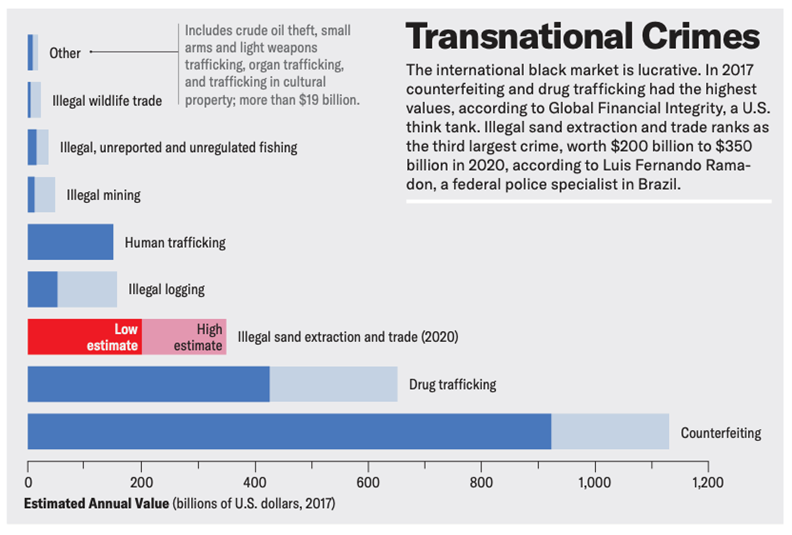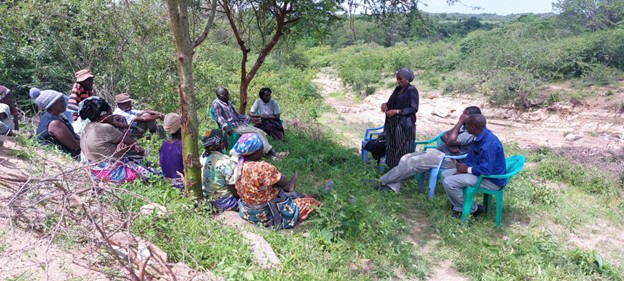-
The Importance of Reporting on Environmental Crime
September 29, 2025 By David A. TaylorEnvironmental crime has long been underreported, but globalization and the increased involvement of organized crime involvement is now contributing to a rise in such crime, especially when compared to other types of crime. The financial toll of environmental crimes has been estimated to be hundreds of billions of dollars while the damage they cause to ecosystems compounds the effects of climate change and inflicts a heavy toll on vulnerable communities.
Discussions in 2022 at the Conference of the Parties (COP) of the United Nations Framework Convention on Climate Change (UNFCCC) highlighted the need to address this convergence of organized crime rings, environmental crimes, and the growing climate threat.
Researchers and advocates are increasingly focusing attention on the mechanisms of environmental crime and how to fight it. The Financial Accountability and Corporate Transparency (or FACT) Coalition is organizing a free online training from September 29 to October 1, 2025 hosted by the U.N. Interregional Crime Research Institute to offer journalists and communication professionals tools that will expand public awareness of this extraordinary challenge.
Assessing a Growth Industry
What has changed to spur the increase in environmental crime? Organized crime rings across national borders have become increasingly sophisticated and more extensive in their operations. Syndicates see sectors such as logging or mining as opportunities affording them little competition and a low public profile, as well as opportunities to deploy their extensive transport networks to an advantage. These crimes rarely attract the same attention from law enforcement as crimes perceived to be violent or “serious.” They can be low-risk and profitable ventures.
Crime networks scale to exploit opportunities, just as legitimate business do. A criminal network centered on transport, for example, can integrate disparate strands of contraband in a way similar to an extensive and established shopping and delivery operation such as Amazon. Rail container cargo as varied as illegal timber, wildlife and narcotics can be combined and shipped.
“It’s sort of a Noah’s Ark of criminality,” says Mark Ungar, a professor of criminal justice and co-author of a 2023 report from the John Jay School of Criminal Justice and the nonprofit Earth League International.
The Environmental Crime Convergence Report published in 2023 offered new insights into this issue, sharing case studies and describing how environmental crime syndicates operate. Yet despite researchers documenting this trend of crime convergence, public perception of environmental crime and its effects has not kept up with its growth. Stories of individual wildlife poachers and illegal logging companies remain more common than the evolving picture. And it can be hard to get stories published that don’t have dramatic and violent headlines.
Journalists and other communicators can improve public awareness of the new reality. There is a clear analog with the problem of white-collar crime: since the 1970s, public views of white-collar crime have evolved from seeing it as “victimless” to understanding that those crimes inflict more systemic damage than small-scale violent crime. Similarly, environmental reporting can show that marginalized communities are often deeply impacted by practices like illegal sand mining.
Awaking New Awareness
The good news is that journalists increasingly have tools available to help them document environmental crimes. Take a 2024 FACT Coalition report on money laundering from environmental crime, which analyzed more than 200 environmental crimes committed in the Amazon region across a decade—and demonstrated how these illicit profits were filtered into the legal economy. Such information not only helps law enforcement strengthen prosecutions and reinforce the rule of law, but reliable analysis and case studies allows journalists to “follow the money” and uncover stories involving shell companies and corruption.
The free online training offered by FACT staff and other leading researchers in the field and hosted by the U.N. Interregional Crime Research Institute offered from September 29 – October 1 is another opportunity to deepen public understanding. Uncovering Environmental Crimes: Online Training for Journalists and Communication Professionals will focus on environmental crimes that pose increased safety and security risks around the world, and offer a multidisciplinary approach for understanding their dynamics and improving media coverage.

Halinishi Yusuf of the Makueni Sand Authority leads a community meeting in Makueni County, Kenya. Photo Credit: Halinishi Yusuf. Crime and Climate Stress
A key element of the training sessions and broader efforts is to examine how the intersection of environmental crime with climate change can alter ecosystems and accelerate degradation.
My own efforts to do so as a science writer have focused on the human dimension of this challenge. As I discovered in interviewing Kenyan geographer Halinishi Yusuf on illegal sand mining, the impact on semi-arid communities, the impacts created by a large volume of sand removed by the truckload to construction sites in cities can combine with several linked climate patterns to cause seasonal rains to become erratic.
Residents of these landscapes saw many trucks coming to take sand away without suspecting the resulting environmental damage until much later. In time, groundwater levels sank, aquifers did not recharge, and farmers found it harder to water their crops. Yusuf had witnessed this phenomenon since her youth, and as the picture became clearer to her, she took a job with a local government’s sand authority, and became part of a regional reduction in sand trafficking. She went on to postgraduate studies in the United Kingdom to probe the issue and its dynamics at a global scale.
Sharing Yusuf’s story is just one example of the power that reporting on these issues from unconventional angles can bring improved awareness of local responses and resources to environmental crime. It also can spur the development of better national policies for stemming the trend.
David Taylor is a freelance writer and adjunct professor with the Johns Hopkins Science Writing Program. His books include Ginseng, the Divine Root (Algonquin) about a medicinal plant’s global trade journey; and Cork Wars (Johns Hopkins Press) about an episode in environmental security. He was a 2025 Fulbright U.S. Scholar in Portugal.
Sources: Earth League International; FACT Coalition; Scientific American; TRaCCC; UNEP; UNICRI
Photo Credit: Licensed by Adobe Stock.
 A Publication of the Stimson Center.
A Publication of the Stimson Center.









